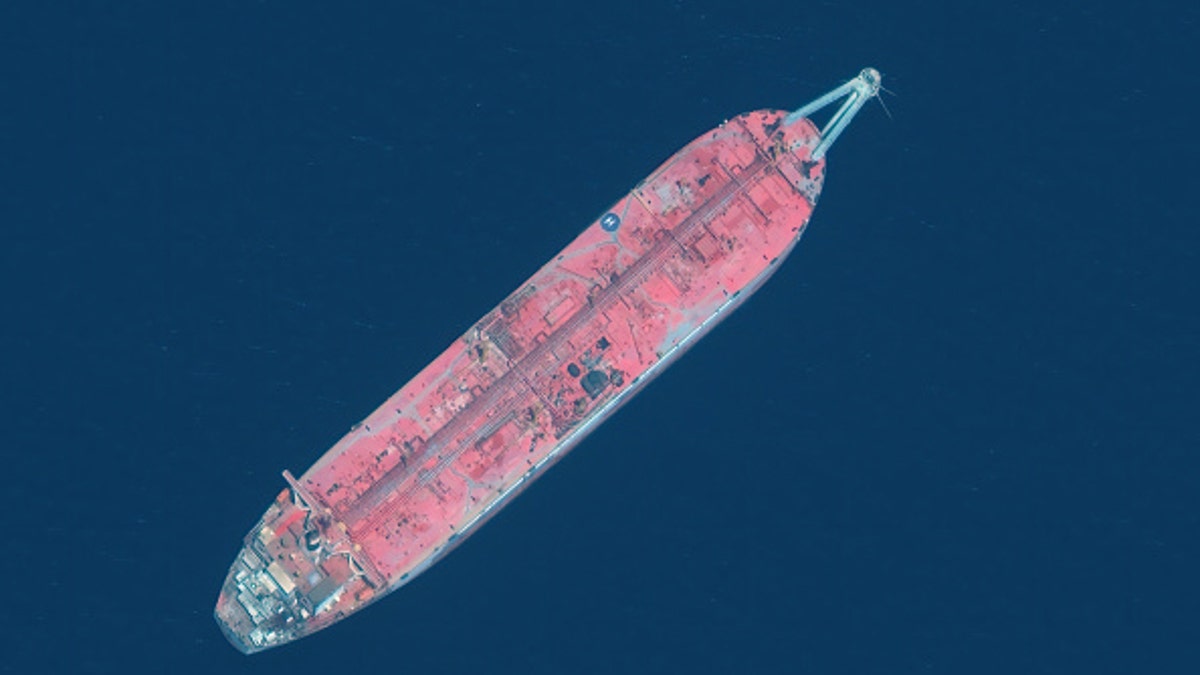Fox News Flash top headlines for July 16
Fox News Flash top headlines are here. Check out what's clicking on Foxnews.com.
An abandoned decaying oil tanker in the Red Sea could spill four times as much oil as the devastating Exxon Valdez disaster, the U.N. has warned.
Fears of an environmental, humanitarian and economic disaster are swirling around the FSO Safer tanker, which is moored off the coast of war-torn Yemen. The tanker is loaded with 1.1 million barrels of crude oil.
The U.N. Security Council discussed the tanker during a briefing Wednesday. In a statement delivered at the briefing, Mark Lowcock, the U.N. under-secretary-general for humanitarian affairs and emergency relief coordinator, explained that, on May 27, seawater began leaking into the ship’s engine room.
"Water coming uncontrollably into the engine room could destabilize the Safer and potentially sink the entire structure,” he said. “That would almost certainly lead to a severe oil spill.”

Maxar Satellite image of the FSO Safer tanker moored off Ras Issa port, in Yemen, on June 17, 2020. (Satellite image (c) 2020 Maxar Technologies.)
Lowcock also highlighted the 1.1 million barrels of oil on the ship. “That’s about four times as much oil as was discharged in the Exxon Valdez disaster – a spill the world still talks about 30 years later.”
The Exxon Valdez spill off Alaska in 1989 sparked a massive environmental disaster, spreading oil over 1,300 miles of coastline. The ship’s grounding at Bligh Reef in southern Alaska spilled about 260,000 barrels of oil, according to the American Oil & Gas Historical Society.
NASA IMAGES REVEAL SHOCKING SCALE OF ARAL SEA DISASTER
Lowcock explained that, if a spill were to occur from the FSO Safer in the next two months, experts are projecting that 1.6 million Yemenis would be directly affected by the disaster. “Essentially every fishing community along Yemen’s west coast would see their livelihoods collapse and would suffer substantial economic losses,” he said. “About 90 percent of people in these communities already need humanitarian assistance.”
"Sea currents and seasonal conditions also mean much of the oil would likely remain near Yemen’s coast rather than dispersing widely,” he added.
The U.N. has been in contact with Houthi rebels, who control the area where the ship is moored, about gaining access to the tanker. The rebels, officially known as Ansar Allah, had previously denied U.N. inspectors access to the vessel.
EXXON VALDEZ EFFECTS STILL LINGER 25 YEARS AFTER OIL SPILL IN ALASKA
“Last week, Ansar Allah authorities confirmed in writing they would accept a long-planned U.N. mission to the tanker, which we hope will take place within the next few weeks,” said Lowcock. “We understand that member states are working to finalize funding to pay for the U.N. mission, which in the first phase will include a technical assessment and any initial repairs that prove possible.”
Maintenance is no longer possible because the damage to the ship is irreversible, experts said, according to a June 26 report from the Associated Press.
"Initial repairs, in so far as they may be possible, may buy us a little more time to find a sustainable solution, but they won’t be enough to eliminate the risk of a disaster,” Lowcock said on Wednesday. Experts, he explained, advise that extracting the oil from the abandoned ship is probably the only way to remove the threat of a spill “for good.”
SCIENTISTS FIND FIRST DIRECT EVIDENCE OF OCEAN MIXING ACROSS THE GULF STREAM
Citing data from Yemen’s Central Statistical Organisation and the country’s Environmental Protection Authority, Yemeni environmental website Holm Akhdar warns that oil spill damage from the SFO Safer could result in 115 Yemeni islands losing their biodiversity. Holm Akhdar also said an environmental disaster could result in 126,000 Yemeni fishermen losing their source of income.
Some 850,000 tons of fish stocks lie in the Yemeni waters of the Red Sea, Holm Akhdar said, and 969 species of fish are endangered by the decaying tanker. Some 300 species of coral reefs are also in danger.
CLICK HERE TO GET THE FOX NEWS APP
The floating tanker is a Japanese-made vessel built in the 1970s and sold to the Yemeni government in the 1980s to store up to 3 million barrels pumped from oil fields in Marib, a province in eastern Yemen before it was exported. The ship is 1,181 feet long with 34 storage tanks.
The Associated Press contributed to this article. Follow James Rogers on Twitter @jamesjrogers









































